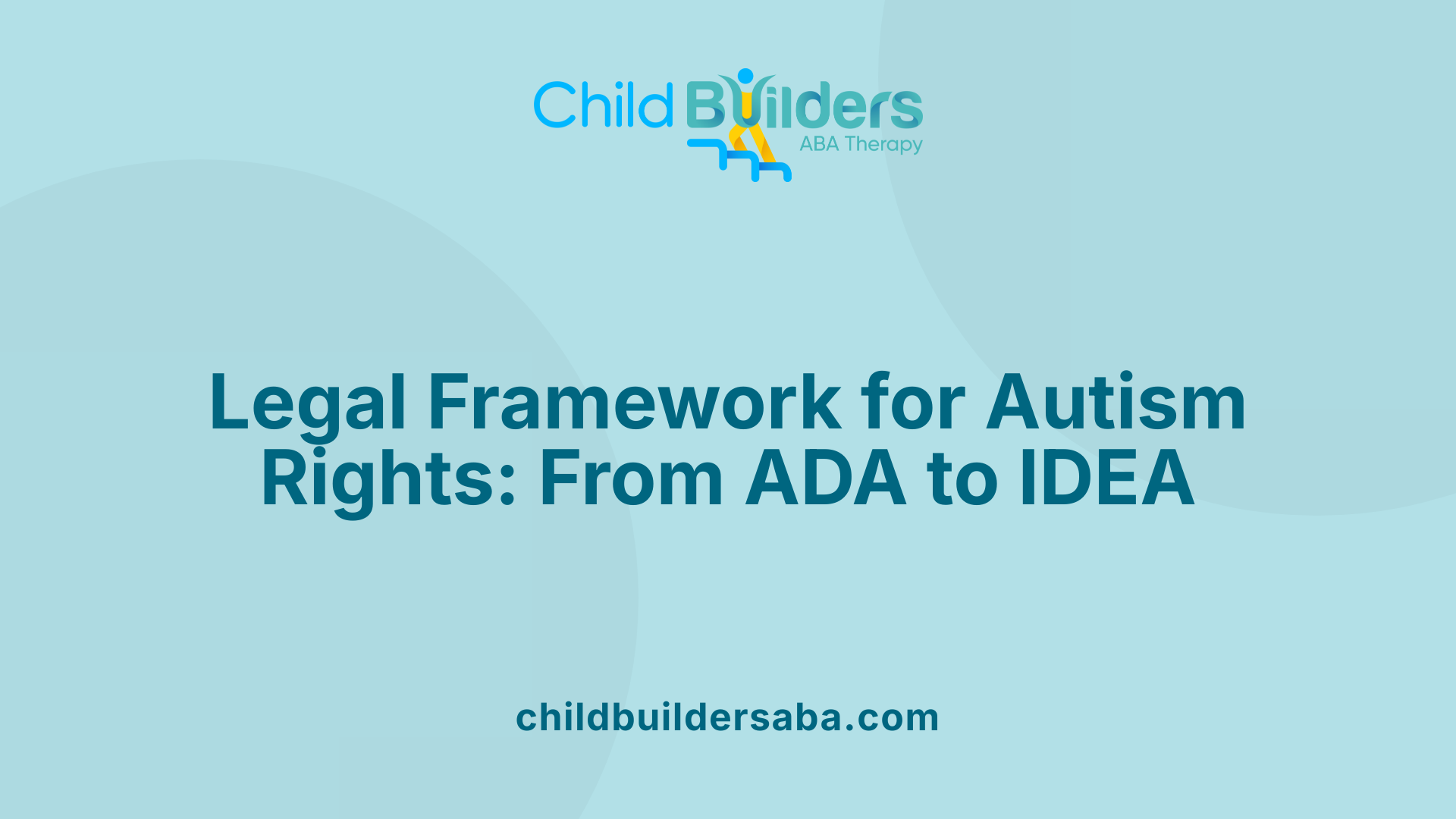Autism Laws And Policies

Understanding the Legal Framework Supporting Autistic Individuals
Autism laws and policies form the backbone of protections that promote inclusion, equal opportunity, and community integration for individuals on the autism spectrum. These legal provisions address key areas such as education, employment, healthcare, and public accommodations, ensuring that the rights of autistic individuals are recognized and upheld across federal and state levels. As awareness continues to grow, recent policy updates and advocacy efforts further strengthen ongoing efforts to combat discrimination, reduce stigma, and foster a society where autistic individuals can thrive independently and actively participate in community life.
Foundational Federal Laws Protecting Autistic Individuals

What are an individual's legal rights and protections under federal law if they have autism?
Individuals with autism possess protection and rights under several comprehensive federal laws. These laws aim to eliminate discrimination, provide access to services, and uphold their independence and dignity.
The Americans with Disabilities Act (ADA), enacted in 1990, is a cornerstone law that prohibits discrimination in employment, public accommodations, transportation, and government services. For those with autism, the ADA mandates reasonable accommodations in workplaces and public settings, facilitating equal participation.
Section 504 of the Rehabilitation Act, passed in 1973, complements the ADA by ensuring that federally funded programs—such as schools, healthcare, and social services—offer equitable access and necessary adjustments to individuals with autism. This law underpins many protections in educational and social programs.
The Individuals with Disabilities Education Act (IDEA), originally enacted in 1975 and revised over the years, emphasizes that children with autism have a right to free and appropriate public education in settings that are as inclusive as possible. It facilitates early intervention, specialized support, and the development of Individualized Education Programs (IEPs) tailored to each child's needs.
Landmark judicial decisions, such as the Olmstead v. L.C. ruling of 1999, reinforce the commitment to community-based living. The Supreme Court declared that unjustified segregation of persons with disabilities constitutes discrimination, requiring states to provide community options when appropriate.
In addition to these laws, programs like Social Security benefits (SSDI and SSI) aid individuals with autism who face employment challenges, helping ensure financial independence.
Together, these laws and decisions create a protective framework that promotes rights, reduces barriers, and fosters the full inclusion of autistic individuals in society.
The Significance of Landmark Court Cases and Policy Decisions
What are the recent policy updates or advocacy efforts related to autism rights?
Recent movements and legislative updates have reinforced support for individuals with autism and their families. In 2024, the reauthorization of the Autism CARES Act has marked a major milestone, allocating substantial funding for autism research, advancing services, and improving data collection efforts. This legislation underscores the federal government’s commitment to understanding autism spectrum disorder (ASD) better and expanding support networks. Additionally, new bills like the ENABLE Act and the Autism Family Caregivers Act have emerged, aiming to enhance healthcare access and strengthen employment and caregiving resources. Advocacy organizations continue to play a pivotal role, pushing for increased funding for autism programs and championing laws that emphasize community-based services and civil rights protections, including the reinforced protections in the Americans with Disabilities Act (ADA). The White House has introduced initiatives aimed at improving mental health services tailored to autistic individuals, emphasizing a holistic approach to support. While these efforts are promising, challenges remain. Some policymakers have considered cuts to Medicaid and research funding, which could hinder progress. Persistent advocacy remains vital to ensure sustained support, equitable policies, and the eradication of misinformation about autism. Overall, ongoing policy reforms and advocacy efforts aim to foster a more inclusive and supportive environment for individuals with autism, promoting health, education, and societal participation.
The Intersection of Education and Employment Laws for Autistic People

What resources and legal protections are available for adults with autism?
Adults with autism benefit from a broad set of laws and resources designed to promote their rights, independence, and social integration. The Americans with Disabilities Act (ADA) and Section 504 of the Rehabilitation Act are foundational protections that prohibit discrimination and mandate reasonable accommodations in employment, education, and public services.
These laws ensure that autistic adults have access to community-based services and support employment opportunities. The Supreme Court's Olmstead decision of 1999 furthers this goal by emphasizing that unjustified segregation of people with disabilities is discrimination, encouraging states to provide community-based living options.
Support services like vocational rehabilitation help individuals find jobs and develop skills, while Medicaid Home and Community-Based Services (HCBS) provide essential health and support in familiar environments. Social Security programs, including SSDI and SSI, offer financial assistance when employment isn't feasible.
Legal advocacy groups like the National Disability Rights Network and Legal Aid at Work play crucial roles in protecting rights and guiding individuals through legal processes. These organizations, coupled with federal programs and outreach, work to improve employment prospects and community participation.
Overall, the combination of laws, services, and advocacy ensures better access, protections, and opportunities for adults with autism, fostering a more inclusive society.
How do laws influence educational and employment opportunities for autistic individuals?
Legislation continually shapes the pathways for educational and employment success for people on the autism spectrum. The Individuals with Disabilities Education Act (IDEA) guarantees free and appropriate public education (FAPE) to students with autism and mandates their placement in the least restrictive environment (LRE). This legal requirement aims to integrate children into mainstream classrooms with proper supports, such as assistive technology, and involves collaborative planning through Individualized Education Programs (IEPs). The law underscores the importance of tailoring educational services to meet individual needs.
For adults, the Workforce Innovation and Opportunity Act (WIOA) expands opportunities for employment and vocational training. WIOA funds supported employment programs, provides job placement assistance, and promotes skill development, allowing autistic adults to attain greater independence and participate fully in the workforce.
The ADA complements these laws by requiring employers to provide reasonable accommodations, thus removing barriers in workplaces. This might include flexible scheduling, modified duties, or assistive devices.
Together, these laws foster an environment where autistic individuals can access tailored educational programs and gain employment, breaking down societal barriers and promoting equity.
| Law/Program | Primary Focus | Impact on Autistic People | Additional Notes |
|---|---|---|---|
| IDEA | Education | Guarantees FAPE and LRE | Involves IEPs, assistive tech |
| WIOA | Employment | Supports job training and placement | Promotes supported employment |
| ADA | Workplace & Public | Mandates reasonable accommodations | Prohibits discrimination |
| Section 504 | Federal Programs | Prevents discrimination in federally funded programs | Ensures access and accommodations |
| Olmstead v. L.C. | Community Living | Emphasizes community-based services | Reduces unnecessary institutionalization |
More Resources and Search Queries
For further insights into legislation and support networks for autism, consider exploring topics such as 'Autism Employment and Education Legislation 2024,' success stories of WIOA and IDEA graduates, and available autism work support resources. Searching terms like 'Education Rights for Autistic Students' and 'Employment Protections for Adults with Autism' can reveal recent updates, advocacy initiatives, and practical guides.
This integration of legal protections, policy initiatives, and community resources continues to enhance the quality of life and societal participation for individuals on the autism spectrum, fostering a future of greater inclusion and opportunity.
Towards a More Inclusive Society
Legislation and policy efforts continue to evolve, striving to create a society where autistic individuals can access meaningful opportunities and live with independence and dignity. Through laws like the ADA, IDEA, and recent federal initiatives such as the Autism CARES Act, the focus remains on fostering inclusion, reducing stigma, and supporting community integration. Advocacy remains vital in ensuring these policies are implemented effectively and that rights are protected. As public awareness increases, so does societal acceptance—moving towards a future where diversity is recognized as strength and every autistic person receives the respect and support they deserve.
References
- Legal | Autism Society
- What are my rights as an adult with autism? | Autism Speaks
- Public Policy | Autism Society
- Rights & Regulations: Education & Advocacy - HANDS in Autism
- Autism in schools: Your child's rights
- Autism Laws and Policies: How Legal Protections Can Prevent ...
- Rights and Challenges for Autistic People with Communication ...
























.jpg)












































































